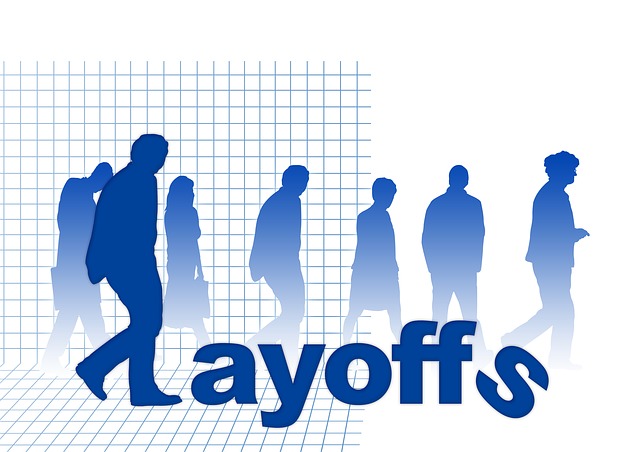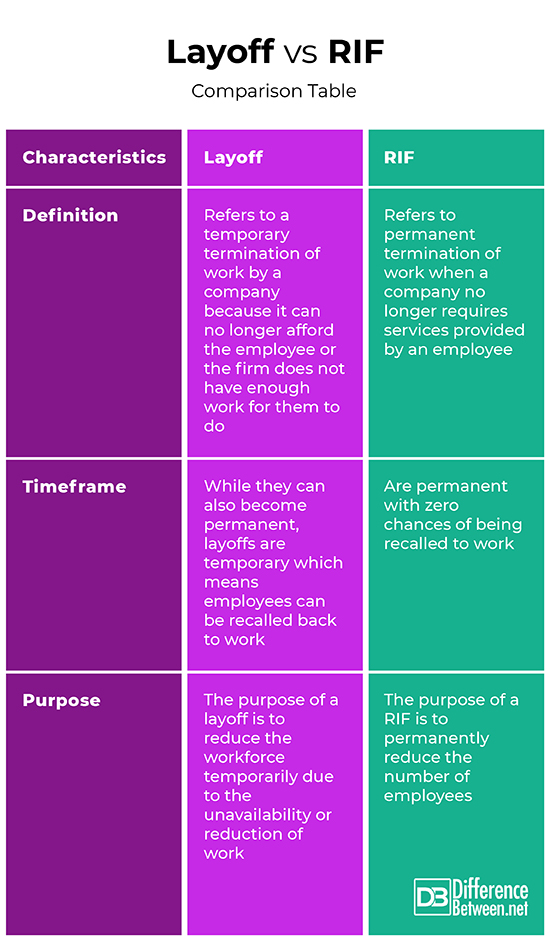Difference Between Layoff and RIF
The rate of unemployment has risen globally. And even with this situation, millions of people are still forced out of work for different reasons. Companies go bankrupt, people get sick not to forget the tough economic periods. You may have come across the term layoff, furlough or reduction in force. When workers hear these terms, it is evident that bad news could be broken. Although used interchangeably, the terms layoff and RIF have differences, as discussed in this article.

What is Layoff?
This is a temporary termination of work by a company because it can no longer afford the employee or the firm does not have enough work for them to do. A layoff is not permanent, rather, there is a chance that the employer may call back the employees to work. Also, employees who are laid off can still access unemployment benefits. However, it can still end up being permanent if the company is unable to get back to its feet.
In most cases, layoffs happen when companies are downsizing, when the economy is experiencing a recession or downturn or when the business decides to close a branch. Companies use different measures to decide who to lay off. For instance, while some companies consider the performance, others may consider the time of hire. However, businesses must ensure that there is zero discrimination when laying off employees.

What is RIF?
Short of Reduction in Force, this is a permanent termination of work when a company no longer requires services provided by an employee. It can be caused by a change in the business strategy, budget cuts or even the closure of a certain office. If issued with a RIF, there is no chance for a re-hire or a re-calling to the said company.
Sometimes, RIFs can be issued in the form of early retirement incentives. RIFs can be beneficial to companies that are struggling financially via cost-cutting. This can avert serious issues such as total closure. When issuing RIFs, companies must adhere to anti-discrimination laws.
Similarities between Layoff and RIF
- Both relate to the loss of income
- In both, employees can receive unemployment benefits if eligible
Differences between Layoff and RIF
Definition
Layoff refers to a temporary termination of work by a company because it can no longer afford the employee or the firm does not have enough work for them to do. On the other hand, RIF refers to permanent termination of work when a company no longer requires services provided by an employee.
Timeframe
While they can also become permanent, layoffs are temporary which means employees can be recalled back to work. On the other hand, RIFs are permanent with zero chances of being recalled to work.
Purpose
The purpose of a layoff is to reduce the workforce temporarily due to the unavailability or reduction of work. On the other hand, the purpose of a RIF is to permanently reduce the number of employees.
Layoff vs. RIF: Comparison Table

Summary of Layoff vs. RIF
Layoff refers to a temporary termination of work by a company because it can no longer afford the employee or the firm does not have enough work for them to do. The purpose is to reduce the workforce temporarily due to the unavailability or reduction of work and reinstate the workers once work is available. On the other hand, RIF refers to permanent termination of work when a company no longer requires services provided by an employee. The purpose is to permanently reduce the number of employees
Is layoffs the same as terminated?
No. Layoffs are temporary termination due to the unavailability of work. Termination, on the other hand, refers to the end of the employment contract due to specific reasons.
Is it better to be laid off or furloughed?
It is better to be furloughed since you are still employed by the company and can also look for work during the furloughed period.
What is an RIF in employment?
This is a temporary reduction of workforce by a company with the intention of re-instating the employees.
Why would a company furlough instead of layoff?
Furlough gives companies the option of retaining staff that they want but cannot afford to pay due to internal issues.
Are you paid during furlough?
No. You are not paid during furlough.
- Difference Between Profit Center and Investment Center - July 2, 2022
- Difference Between Anti-Trust and Anti-Competition - June 6, 2022
- Difference Between Stocktaking and Stock Control - June 6, 2022
Search DifferenceBetween.net :
Leave a Response
References :
[0]Purdue University. The ABC's of EEO for Small Businesses and Supervisors. U.S. Equal Employment Opportunity Commission Training Institute, 2004. https://books.google.co.ke/books?id=8riswY8BPg0C&pg=PA69&dq=Difference+between+Layoff+and+RIF&hl=en&sa=X&ved=2ahUKEwiitcPTyrXyAhUMDxQKHXukD1YQ6AEwAHoECAYQAg#v=onepage&q=Difference%20between%20Layoff%20and%20RIF&f=false
[1]Rob Day. Street Smarts for Global Business: A Practical Guidebook for Global Business Executives. Rob Day, 2008. https://books.google.co.ke/books?id=CbJLbdjXI6wC&pg=PT89&dq=Difference+between+Layoff+and+RIF&hl=en&sa=X&ved=2ahUKEwiitcPTyrXyAhUMDxQKHXukD1YQ6AEwBXoECAcQAg#v=onepage&q=Difference%20between%20Layoff%20and%20RIF&f=false
[2]Zenichi Shishido. Enterprise Law: Contracts, Markets, and Laws in the US and Japan. Edward Elgar Publishing, 2014. https://books.google.co.ke/books?id=zQhCBAAAQBAJ&pg=PA56&dq=Difference+between+Layoff+and+RIF&hl=en&sa=X&ved=2ahUKEwiitcPTyrXyAhUMDxQKHXukD1YQ6AEwBnoECAQQAg#v=onepage&q=Difference%20between%20Layoff%20and%20RIF&f=false
[3]Image credit: https://pixabay.com/illustrations/termination-silhouettes-people-110302/
[4]Image credit: https://pixabay.com/vectors/people-special-different-employment-4009327/
